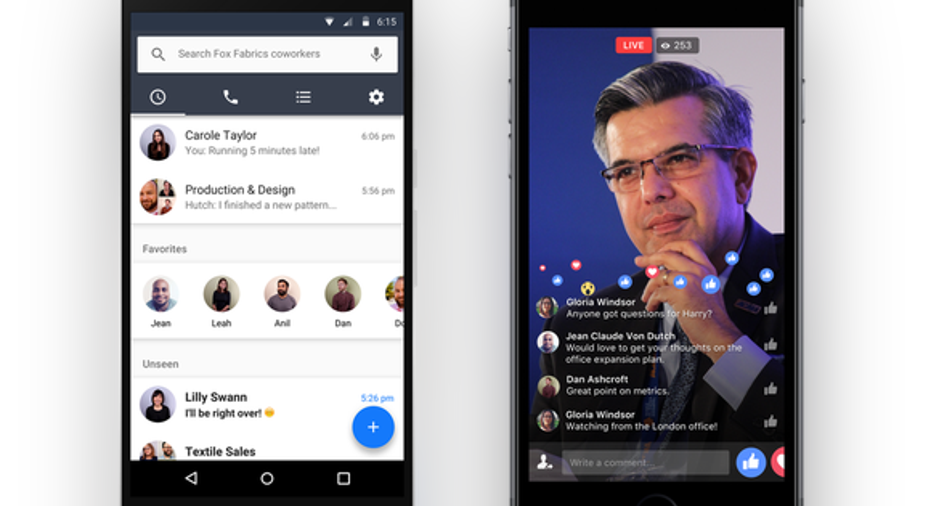Facebook, Inc.'s Workplace Platform Is Here -- And It's Priced Competitively

Image source: Facebook.
As expected, social media giant Facebook (NASDAQ: FB) announced on Monday that its new workplace platform is now live for "any company or organization that wants to use it." Called Workplace, the collaboration platform aims to enable more effective communication at work.
Workplace enters a highly competitive market for enterprise collaboration platforms, including names like the rapidly growing Slack and Cisco's Jabber, among others. Can Workplace stand out from the incumbents?
Introducing Workplace
What is Workplace?
"Workplace is a dedicated and secure space for companies to connect, communicate and collaborate," Facebook says on the frequently asked-questions portion of its Workplace website. "Organizations of all sizes can use familiar Facebook features such as News Feed, groups, messages and events to get things done."
As a comprehensive collaboration tool, Workplace can essentially replace chat-based collaboration tools like Slack and video conferencing platforms like Miscrosoft's Skype.
A key selling point is that the platform is "easy to use because it's based on familiar Facebook features," Facebook asserts. Users can interact through products used on the original Facebook platform, such as direct messages, posts, comments, groups, tagging, live video, the News Feed, and more.
Workplace. Image source: Facebook.
Importantly, Workplace doesn't require a personal Facebook account and is totally separate from a user's Facebook friends and family.
Facebook actually started testing Workplace over a year ago. So it's had some time to fine-tune the offering. The company says it now has more than 1,000 organizations using the platform.
"People have created nearly 100,000 groups and the top five countries using Workplace are India, the U.S., Norway, UK and France," Facebook said in its announcement on Monday.
Current customers using Workplace are wide ranging, including companies like Starbucks, Booking.com, Danone, YES Bank in India, and the Government Technology Agency of Singapore.
The business model
Facebook is already monetizing the platform, though not with ads like it usually does. With the exception of non-profits and educational institutions, which can use the platform free of charge, Facebook is charging businesses between $1 and $3 per monthly active user, depending on how many users a company has on the platform. This pricing is aggressive, considering Slack costs about $7 per user for its standard package.
Further, if Facebook's decision to undercut the fastest growing workplace collaboration app so significantly isn't already enough evidence of how seriously the social network is taking this new product, Facebook is also enlisting important names, including companies like Deloitte, Sada Systems, and G Suite to help customers move over to Workplace.
Facebook explained this partnership in its announcement on Monday:
While it's too early to judge how meaningful this product will be for Facebook, or whether or not it can successfully draw customers away from existing collaboration platforms like Slack, the company's running start clearly suggests the fast-growing king of social networks intends to succeed in this market.
A secret billion-dollar stock opportunity The world's biggest tech company forgot to show you something, but a few Wall Street analysts and the Fool didn't miss a beat: There's a small company that's powering their brand-new gadgets and the coming revolution in technology. And we think its stock price has nearly unlimited room to run for early in-the-know investors! To be one of them, just click here.
Daniel Sparks has no position in any stocks mentioned. The Motley Fool owns shares of and recommends Facebook. The Motley Fool owns shares of Microsoft. The Motley Fool recommends Cisco Systems. Try any of our Foolish newsletter services free for 30 days. We Fools may not all hold the same opinions, but we all believe that considering a diverse range of insights makes us better investors. The Motley Fool has a disclosure policy.



















